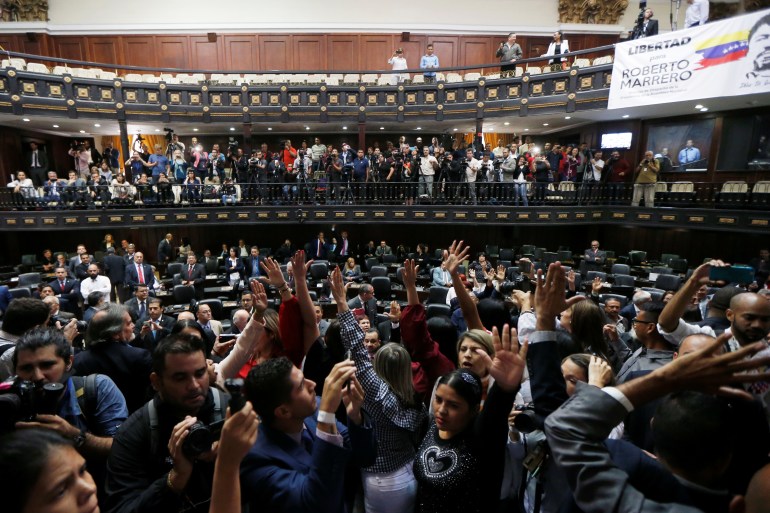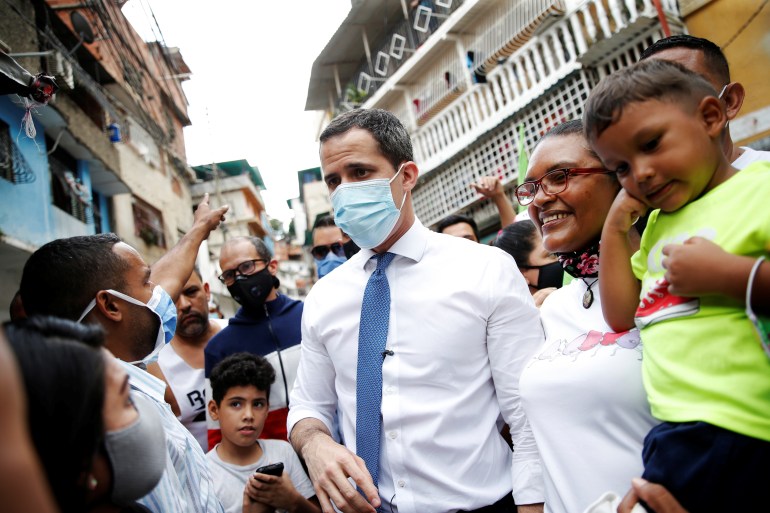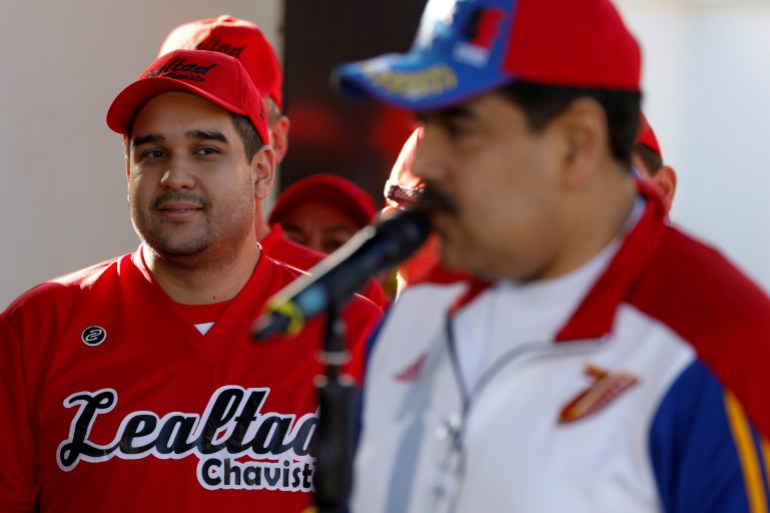Venezuela will hold parliamentary elections on Sunday to decide the makeup of the National Assembly, the only government branch controlled by opposition parties in the deeply divided South American country.
Opposition leader and National Assembly Speaker Juan Guaido, Venezuela’s self-proclaimed interim president and an opponent of President Nicolas Maduro, has announced a boycott of the vote.
Guaido says the election is a fraudulent attempt to place the National Assembly into government hands, while the United States, European Union and the Organization of American States (OAS) have also said they fear the contest will not be free and fair.
Venezuelan opposition parties instead have called for a referendum – expected from December 7 to 12 – to counter the vote.
But the Venezuelan government says election conditions are not different from the last National Assembly vote in 2015, when the opposition won control. It has accused opposition leaders of pursuing a boycott because they fear losing and are not committed to democracy.
“Since 2016, this opposition has refused to use the democratic institutions,” Andreina Tarazon, a Venezuelan politician from the United Socialist Party of Venezuela (PSUV) and president of the Centre for Higher Studies of Development and Emerging Economies, said.
“They refuse to accept any legal argument, and instead they rely on the use of force as a means for bringing change in the country.”
After weeks of heated rhetoric and intense debate between the factions, many Venezuelans are hoping the vote will bring more stability to the country, while some, especially opposition supporters, fear it will set back democratic life in the country.
Here, Al Jazeera examines what to expect in the legislative elections:
How many people will vote?
The National Electoral Council says that 20.7 million people – including 250,000 first-time voters – are eligible to cast ballots in the parliamentary elections on Sunday.
The election takes place amid the COVID-19 pandemic, which has infected more than 100,000 people in Venezuela, government data shows.
The government said voters will need to wear face masks, voting machines will be disinfected after every vote, and the Bolivarian Militia, a branch of the armed forces, has been tasked with guaranteeing social distancing.
In the country’s 2015 parliamentary elections, nearly 13 million people cast ballots.
A recent opinion poll by Datanalisis found that 60 percent of 500 respondents said they would not vote on Sunday, Reuters News Agency reported, while 34 percent said they wanted to vote.
Who will they elect?
The election will decide 277 National Assembly seats, an increase of 110 from the previous legislature after the National Electoral Council boosted the number of legislators in June.
The winners will be elected to their posts for five years, from January 5, 2021, to January 5, 2026.
A total of 107 political parties are participating in the elections.
Some opposition dissidents have criticised Guaido for calling for a boycott and they will take part in the election despite being accused that doing so would lend Maduro legitimacy, AFP News Agency reported.
Why is this election important?
The National Assembly is the only of Venezuela’s five state branches that the Maduro government does not control. It is also the only institution that can approve oil exploration and extraction deals, a key power in oil-rich Venezuela.
In opposition control since 2016, the legislature has prevented Maduro from securing more foreign investment for the country’s oil industry, hitting the economy hard and blocking the government from managing deals that could inject much-needed capital into a collapsing crude production.
This, along with US sanctions, has devastated the national economy.
“This election is not a democratic process,” Ronal Rodriguez, a researcher at the Venezuelan Observatory at the University of Rosario in Colombia, told Al Jazeera about the upcoming vote.
“But it’s relevant because through it the government will give certainty to its international allies: Russia, Iran, Turkey, China,” Rodriguez said.
“They now can engage in negotiations that involve Venezuela’s natural resources, and that will impact Venezuela’s economy, as those negotiations will now be honoured by the National Assembly.”
 People raise their hands during a swearing-in ceremony at Venezuela’s National Assembly building in Caracas [File: Manaure Quintero/Reuters]
People raise their hands during a swearing-in ceremony at Venezuela’s National Assembly building in Caracas [File: Manaure Quintero/Reuters]But beyond those decision-making powers, the National Assembly holds key importance for Guaido.
The opposition leader became speaker of the legislative body in 2019, a position from which he accused Maduro of presiding over a fraudulent 2018 election, pledged to remove him, and named himself interim president.
The move sparked huge street demonstrations across Venezuela and won support from dozens of nations, including the US.
“This election could give Maduro and his party full control of the institutions,” Carlos Pina, an analyst from the Central University of Venezuela, told Al Jazeera.
“This could lead to a direct dialogue between his government and the US since Maduro would have more room for manoeuvre inside the country.
“If this were to happen, this would be a major blow to Guaido, as it would represent an effective recognition from the US to the government of Maduro.”
 Venezuela’s opposition leader Juan Guaido greets supporters at the low-income neighbourhood of Santa Cruz del Este in Caracas [File: Manaure Quintero/Reuters]
Venezuela’s opposition leader Juan Guaido greets supporters at the low-income neighbourhood of Santa Cruz del Este in Caracas [File: Manaure Quintero/Reuters]What does the government say?
Maduro has campaigned extensively for his party’s congressional candidates – including his son and wife – promising to finally silence the “radical” wing of the opposition, which he accuses of inciting violent protests.
Maduro has endured hardline US foreign policy. Last year, his administration was hard hit by punishing sanctions targeting state-run oil firm PDVSA and cutting him off from billions of dollars annually.
“The opposition doesn’t understand yet the nature of the country,” Tarazon, the politician, said. “We believe in the principle of self-determination and we will defend our autonomy.
“We won’t stand for policies that will end subordinating our national politics to international interests.”
 Nicolas Maduro Guerra, son of Venezuela’s President Nicolas Maduro and a candidate running for a position in the National Assembly, looks as his father talks to the media before a softball game with ministers [File: Marco Bello/Reuters]
Nicolas Maduro Guerra, son of Venezuela’s President Nicolas Maduro and a candidate running for a position in the National Assembly, looks as his father talks to the media before a softball game with ministers [File: Marco Bello/Reuters]What does the opposition say?
The opposition represented by Guaido says it will not recognise a “false” electoral authority.
Guaido has accused the government of naming loyalist, Supreme Court-appointed officials to the main electoral body ahead of the vote in an attempt to guarantee support for Maduro and said the electoral body should have been set up by the National Assembly.
Instead of participating in Sunday’s elections, Guaido and his allies will hold a “popular consultation” beginning on December 7 that aims to measure popular support for ending Maduro’s rule, holding new elections and seeking international backing to solve the country’s crises.
Civil society groups are organising the referendum without any independent audit or observers.
“The questions that are being asked in this consultation don’t generate any impact on the lives of Venezuelans,” Rodriguez said.
“In its essence, it’s a mechanism that will try to show the international community that [the opposition] still has internal support it says it has, and to demonstrate it’s visible in the political scene.”
What will the vote say about Venezuela’s future?
Analysts say these are challenging times for the opposition and for Guaido in particular.
“When you say that you’ll recognise Guaido until the end of Maduro’s time in power, how long do you mean?” Luis Vicente Leon, president of the Caracas-based polling firm Datanalisis, said.
“One year, five, 20? Are we talking about an emperor? Sooner rather than later that symbolic recognition of Guaido explodes, if he can’t produce change, and that’s where Maduro is winning the hand.”
Meanwhile, Venezuelans continue to struggle with hyperinflation, acute shortages of basic services, unemployment and now the COVID-19 pandemic.
“I believe that the people are losing interest for the politics in the country,” Jose Meza, a Venezuelan journalist with El Nacional newspaper, told Al Jazeera.
“The population is at that stage where surviving and resolving the challenges is more important than engaging in a political fight.”
"Here" - Google News
December 06, 2020 at 03:27AM
https://ift.tt/36JJde1
Here’s all you need to know about Venezuela’s legislative polls - Aljazeera.com
"Here" - Google News
https://ift.tt/39D7kKR
Shoes Man Tutorial
Pos News Update
Meme Update
Korean Entertainment News
Japan News Update
:no_upscale()/cdn.vox-cdn.com/uploads/chorus_asset/file/25244079/4.png)
No comments:
Post a Comment